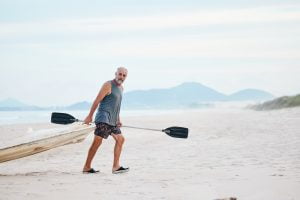 Change is the one constant in our lives. Change is both persistent and inevitable, whether in our relationships, our circumstances, and even our bodies and minds. Getting older is something that most of us will experience. Aging typically means that we start to decline in our health and find ourselves more limited in our capacities.
Change is the one constant in our lives. Change is both persistent and inevitable, whether in our relationships, our circumstances, and even our bodies and minds. Getting older is something that most of us will experience. Aging typically means that we start to decline in our health and find ourselves more limited in our capacities.
However, we don’t get old or experience the aging of our bodies in the same ways. Have you ever encountered older people whose minds and wit are still sharp, or who are physically active in a way that puts younger people to shame? That isn’t the experience of all older people, but it does suggest an interesting disruption to the narrative that getting older only looks a certain way. Simi Valley Christian Counseling provides support and guidance for individuals navigating the unique challenges and blessings of aging.
Challenges of aging in America
The glory of young men is their strength, gray hair the splendor of the old. – Proverbs 20:29, NIV
This proverb emerges from a time and culture in which getting older was viewed as a sign of blessing and something to be embraced. Gray hair is a sign of a long life, and of wisdom obtained during that life. While young people may have physical strength, older people have their badge of honor that indicates their station in life.
The United States is a melting pot with many different cultures and ways of looking at life. It is true to say that loud voices, through our media, the movies, and TV shows we consume all seem to push the perspective that getting older is something to avoid.
Even the appearance of advanced age seems something to eschew, at least if you’re paying attention to the myriad commercials touting face creams that supposedly roll back the years to make you look younger.
In America aging isn’t often viewed as a good thing. It is often synonymous with irrelevance, lacking in beauty, and being no longer useful. One of the challenges of aging in America is that you must deal with this perception of yourself, whether it’s rooted in your self-understanding or coming from the culture around you.
One must remain confident of his or her self-worth in a context where it may be questioned. Other challenges to aging in America include the following:
Loss of identity
In his classic work Making All Things New, Henri Nouwen writes,
 “In our production-oriented society, being busy, having an occupation, has become one of the main ways, if not the main way, of identifying ourselves. Without an occupation, not just our economic security but our very identity is endangered. This explains the great fear with which many people face their retirement. After all, who are we when we no longer have an occupation?”
“In our production-oriented society, being busy, having an occupation, has become one of the main ways, if not the main way, of identifying ourselves. Without an occupation, not just our economic security but our very identity is endangered. This explains the great fear with which many people face their retirement. After all, who are we when we no longer have an occupation?”
We Americans are hardworking people, and that’s a good thing. It can become a problem if, as Nouwen suggests, we begin to identify ourselves with our work. If one’s sense of who they are is closely tied to their work, then the loss of that work either through getting laid off or retiring can be devastating.
Loneliness
Loneliness is the feeling of distress that arises from the perception that one’s need for connecting to others in a socially meaningful way is not being met. We can experience loneliness at any stage of our lives, but older adults are at an increased risk for loneliness and social isolation because they are more likely to face issues such as living alone, the loss of family or friends, and chronic illness. Older people are at a much higher risk of experiencing the related adverse health outcomes of loneliness.
Before the pandemic, about 19% of adults over age fifty-five in the US were “frequently” lonely, according to data from the Health and Retirement Study (HRS).
A report from the National Academies of Sciences, Engineering, and Medicine (NASEM) suggests that around 35% of adults aged forty-five and older, and around 43% of adults aged sixty and older feel lonely, while around 24% of adults aged sixty-five and older are considered to be socially isolated and report feeling lonely.
Health challenges
Getting older will often mean that one is more vulnerable to illness, and injuries take longer to heal. Some of the common conditions in older age include hearing loss, cataracts, refractive errors, falls, back and neck pain and osteoarthritis, Alzheimer’s, osteoporosis, influenza and pneumonia, cancer, chronic obstructive pulmonary disease, diabetes, depression, and dementia.
Reduced income
As one gets older, one’s capacity for economic activity will change. Getting older often means having to retire, and with that is reduced income and financial pressures, particularly if one’s costs such as health care increase. Limited income is a significant challenge for many seniors.
Becoming more vulnerable

As one gets older, one may become more vulnerable to illness, injury, isolation, elder abuse, and even to financial scams. In 2021, there were around 92,000 older victims of fraud which resulted in around $1.7 billion in losses.
Some of the most common financial scams targeting older people include government impersonation scams, sweepstakes scams, computer tech support scams, and phone and robocall scams. Financial crimes against older adults can be devastating, often leaving the victims with no way to recoup their losses.
Overcoming challenges that come with getting older.
There is no question that these challenges are significant. The good news is that there are resources available to help older Americans cope. Some of the ways one can overcome the challenges of aging include the following:
Reorient your life.
It’s never too late to change things in your life in your pursuit of flourishing. One way to do this is to relocate the center of gravity and attention in your life, as well as your priorities, away from the many things that cause you to worry, and toward the unchanging and eternal Kingdom of God. Proverbs 4:18 (ESV) says, “The path of the righteous is like the light of dawn, which shines brighter and brighter until full day.”
John Piper said the following:
“The Christian life is not moving toward night; it’s moving toward noon. There are no sunset years. There’s only eleven to noon, which means that you don’t have to scramble to bring heaven into this world, which is the entire mindset of the world that’s spending billions of dollars to get you to buy the dream or prepare to buy the dream.”
What this means is that the purpose of your life doesn’t end because you’ve gotten older. If God is at the center of everything in your life, then a change in circumstances doesn’t mean an end to your purpose, but simply its transformation.
In God’s Kingdom, you’re never past it, irrelevant, or useless. Our lives flourish when they are oriented around God and bringing Him glory, as Scripture reminds us by saying, “So, whether you eat or drink, or whatever you do, do all to the glory of God” (1 Corinthians 10: 31, ESV). You can continue doing this for all eternity.
Be vigilant.

Talk with your children or someone you trust before sending money or handing over confidential information. And if something should go wrong, there’s nothing to be ashamed of if you think you’re a victim of a financial scam. Have on hand the phone numbers of resources that can help, including the local police, your bank, and Adult Protective Services.
To get the contact information for Adult Protective Services in your area, you can call the Eldercare Locator, a government-sponsored national resource line, at 1-800-677-1116, or visit their website. You can also report fraud or scams to the Federal Trade Commission, which can help prevent it from happening to someone else.
Know the benefits available to you.
Financial woes can be particularly stressful when you’re older. The AARP Foundation has resources available to help older Americans struggling with problems of hunger, isolation, income, and housing.
Programs and benefits are available in different states, as are different services such as the Back to Work 50+ which helps 50+ job candidates connect with employers, or others such as Low-Income Home Energy Assistance Program (LIHEAP) which helps with energy costs.
Stay healthy.
It’s important to stay healthy, and that includes getting a regular form of exercise for your body and your mind. Regarding exercise, do what will help you get up and moving, including running, swimming, walking, yoga, cycling, Pilates, rowing, and so on.
Before you embark on your exercise, make sure to consult your doctor as some forms of exercise may not be good for you. Make sure to eat healthy foods such as fresh fruit and vegetables and get good sleep.
Connect with others.
There are many resources available that can connect you to community resources from institutions such as the AARP, Areas Agencies on Aging, Eldercare Locator, National Council on Aging, and the National Institute on Aging. Many churches also have ways of connecting with older Americans, and you can ask a pastor to help you.
Reorienting your life and being equipped to deal with getting older may also mean finding help from a counselor. A Christian counselor at Simi Valley Christian Counseling can help you unpack your concerns about getting older, work with you as you uncover unhelpful or unhealthy patterns of thought surrounding aging and provide you with tools to help you cope with change.
You may be going through a crisis regarding getting older, or perhaps it’s a loved one you want to support on their journey. Whatever the case may be, you can reach out for help and contact a counselor for more information and an appointment.
“Barista”, Courtesy of Centre for Ageing Better, Unsplash.com, CC0 License; “Holding Hands”, Courtesy of Nani Chavez, Unsplash.com, CC0 License; “Kayaker”, Courtesy of Natalia Blauth, Unsplash.com, Unsplash+ License; “Hike”, Courtesy of sk, Unsplash.com, CC0 License
- Kate Motaung: Curator
Kate Motaung is the Senior Writer, Editor, and Content Manager for a multi-state company. She is the author of several books including Letters to Grief, 101 Prayers for Comfort in Difficult Times, and A Place to Land: A Story of Longing and Belonging...
DISCLAIMER: THIS ARTICLE DOES NOT PROVIDE MEDICAL ADVICE
Articles are intended for informational purposes only and do not constitute medical advice; the content is not intended to be a substitute for professional medical advice, diagnosis, or treatment. All opinions expressed by authors and quoted sources are their own and do not necessarily reflect the opinions of the editors, publishers or editorial boards of Stone Oak Christian Counseling. This website does not recommend or endorse any specific tests, physicians, products, procedures, opinions, or other information that may be mentioned on the Site. Reliance on any information provided by this website is solely at your own risk.





